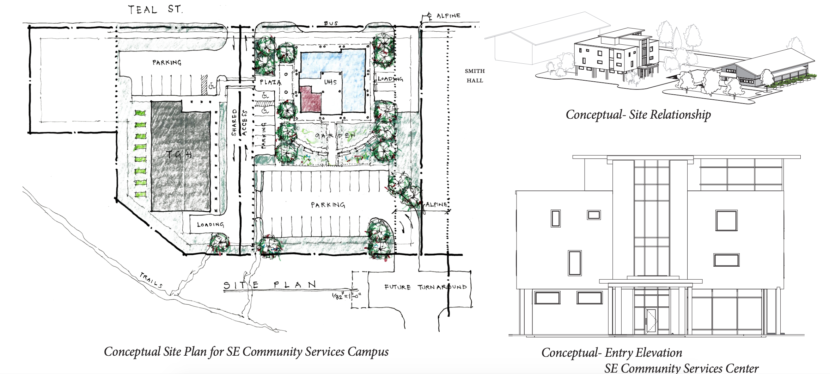
About a year ago, Glory Hall director Mariya Lovishchuk was figuring out the relocation of Juneau’s downtown homeless shelter when she got a call from Joan O’ Keefe, executive director of both United Human Services and Southeast Alaska Independent Living, to collaborate on the creation of a social services campus. The campus would be a space where people could access a variety of social services in one location, cutting costs and increasing accessibility for all involved. It’s a vision service providers have held for almost a decade.
“It really seemed the stars were completely aligned,” Lovishchuk said in a Juneau Afternoon interview.
United Human Services, in collaboration with The Glory Hall and other service providers, is coordinating the development of the Southeast Community Services Campus.
“It’s a one-stop-shop model for people who need services,” O’Keefe said.
The Southeast Community Services Campus will consist of two buildings: the Glory Hall’s new shelter and a nonprofit center.
The nonprofit center will house organizations like National Alliance on Mental Illness, United Way, Southeast Alaska Independent Living, Alaska Legal Services, Big Brother Big Sister, The Disability Law Center and United Human Services — all of which have a 10-year commitment to be on the campus. There will also be a garden and a pedestrian walkway connecting the buildings.
The campus will be located near the airport, at the intersection of Teal St. and Alpine Ave., conveniently placed near Juneau Youth Services, Tlingit and Haida Central Council and St. Vincent de Paul Society.
There are more than 200 multi-tenant nonprofit centers already across the U.S., O’Keefe says. The one-stop-shop model allows for local service providers, who often share clients, to collaborate while making it easier for anyone to access services by mitigating the costs of transportation, resources and the time it would usually take to shuttle from appointment to appointment around the city.
“It’s hard to connect to services, and you really need a lot of resources to get out of homelessness,” Lovishchuk said. “Having a nonprofit center right next door, not worrying about getting people to services — I can’t imagine anything better.”
It’s the right time for this to come to fruition, Lovishchuk said. With COVID-19, there is an even greater strain on service providers: the Glory Hall has lost three-fourths of their capacity, and staff at SAIL are busier than ever.
“There’s a lot of need out there, and unfortunately I think it’s going to get worse than better,” O’Keefe said.
The Southeast Community Services Campus is currently in the fundraising phase of development. The Glory Hall has completed its architectural design and is aiming to complete the construction of its new shelter in the next year.
Listen to the entire interview featuring Mariya Lovishchuk and Joan O’ Keefe:
